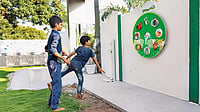It was a warm September morning and the house of an employee of the Northern Power Distribution Company of Telangana Ltd was decked up for a small yet intimate religious ceremony in the small village. It was a joyous occasion for the man, in his forties, and his wife. A long wait for the couple to adopt a child had finally come true—this was to be the ‘homecoming’ of a 10-year-old boy the couple had ‘adopted’ a few days earlier from a care home in Mumbai. But the story didn’t have a happy ending. A police team swooped on the house that day and arrested the man on charges of kidnapping—the boy he had adopted was found to have been kidnapped from Mumbai earlier. The man landed in jail, though he claims he was the victim of an elaborate racket.
Last year, a man in Mumbai found out that his three children—put in a childcare home run by a well-known charity after the death of their mother—have been adopted by an American couple without his knowledge. He has been fighting a legal battle since then. His case may be not exactly of fraud as the charity had put out newspaper notices about the plan to put up the three children for adoption. But for many others, it has been a nightmarish experience after being taken for a ride by organised gangs.
Experts and activists say the main reason for adoption frauds are India’s complicated laws and their cumbersome implementation process due to which couples desperate to adopt children often look for unauthorised channels. India tightened its adoption rules after cases emerged of parents being coerced or tricked to give up their children for inter-country adoptions. And the involvement of doctors, nurses and orphanage officials in a racket that runs into crores of rupees annually makes it all the more difficult for unsuspecting couples in detecting fraudulent deals. Sometimes, of course, couples go ahead despite being aware of the illegal nature of the adoption process.
***
Ashok Chand, a former deputy commissioner of police (crime) who had unearthed at least three adoption rackets in Delhi around 2010, says that racketeers have more or less the same modus operandi in which they either buy children from poor parents or ask them to conceive and hand over the newborn to needy parents in return for money.
“One gang had four members, including two women, a doctor and another man. The women were operating the racket in the garb of running NGOs,” Chand says.
They used to bring newborn babies from poor parents, and then one of the women used to get admitted to the hospital and pretend that she had given birth to the baby. They used to forge birth certificates and other papers with the help of the doctor and give the baby to the couple they had lured for adoption. “We had rescued an 11-day-old girl and an eight-month-old boy whom they were planning to sell at Rs 1.8 lakh. The biological parents would get only Rs 30,000,” Chand says.
Legal experts say that in such cases, all the parties—from biological parents to middlemen to couples—come under the scanner for violation of adoption laws. “Normally, the biological parents take the plea that their children have been stolen and they are victims. In some cases, they have a genuine plea, but, in many cases, they remain hand in glove with the agents,” says Anand S. Jondhale, a Supreme Court advocate who deals with cases of adoption crime. “Similar is the case with couples involved. Some of them are duped, while many others enter into the adoption process knowing that it is not legal. However, when they are caught, they take the plea that they were defrauded. Couples are booked under charges of kidnapping and abduction along with other middlemen.”
Adopting kids through unauthorised channels carries several risks to couples. A couple based in Patna had an unpleasant experience of going through the process of adoption when they were taken for a ride by some unauthorised agents. “We paid Rs 1 lakh as advance money to an agent who came in our contact through a known source. He introduced us to another couple who used to live in a slum area. They had two daughters. The agent paid Rs 50,000 to the couple and the deal was that the woman would conceive and, if she delivered a girl, she would give us the newborn for adoption. But in case it was a boy, she had to return the money,” says the husband who works as a contractor.

He adds, “She conceived and we used to keep track of her every fortnight. But when the delivery date came closer, we realised that they had disappeared.” Later, one of their neighbours informed the couple that the family had managed to get an illegal prenatal foetus sex identification done, which showed the unborn child was a boy. “They disappeared as they were in no position to return the money. ”
***
In a recent case, Bangalore police busted a gang of five—including two women—which used to purchase kids from beggars and slum dwellers at Rs 70,000 to 80,000 each, and sell them to rich childless couples for more than Rs 3 lakh each. In the past two years, they stuck a deal for 28 children before their luck ran out. Investigations reveal that that racket extended to other cities such as Mumbai and Chennai. “We suspect the involvement of more people in this racket. We have identified all the 28 children who have been sold,” a senior police officer tells Outlook.
In a country where more than 1 lakh children go missing every year, there are huge opportunities for criminal gangs to run illegal activities like adoption rackets. There have also been numerous cases of children being sold from orphanages with fake adoption papers to give legal cover to the deals.
There have been several cases in the past in which childcare homes run by well-known welfare institutions were alleged to be involved in the sale-purchase of children in the name of adoption. In 2018, a nun and a worker of a care home run by Mother Teresa’s Missionaries of Charity in Ranchi, Jharkhand, was allegedly involved in the sale of three to five children. This had prompted then Union minister of women and child development Maneka Gandhi to direct all states to inspect the childcare homes run by the Missionaries of Charity.
***
In several cases, government officers and members of the Child Welfare Committee—an autonomous body constituted under the law in every district to deal with children in need of care and protection—have been found involved in illegal adoption rackets. In an adoption racket busted in February 2017 in Jalpaiguri, West Bengal, investigations revealed that the district child protection officer and a member of the Child Welfare Committee were allegedly involved in the sale of at least 17 children, both in India and abroad.
It was a riveting case of international trafficking where children were illegally given to NRIs, violating rules of adoption. Interestingly, when the matter landed in the Supreme Court, it was appalled to see how two statutory bodies—the National Commission for Protection of Child Rights and the State Commissions for Protection of Child Rights—were engaged in a legal battle over their rights and power of investigation. “This case is a classic example where the children have been all but forgotten in the fight between the State Commission and the National Commission. We are sorry that this court has to spend its time resolving such disputes,” a bench headed by Justice Deepak Gupta said while passing the judgment.
In June 2021, the Supreme Court took suo moto cognisance when social media posts appeared with requests for adoption of children allegedly orphaned in the pandemic or left with single parents. Lawyer Shobha Gupta, who appeared in the case for We the Women of India, said in court that most of the social media posts were fake and, in any event, no adoption is permissible without the involvement of the Central Adoption Resource Authority (CARA). After the top court passed several directions to the Centre and states, the governments identified 30,071 children who became orphans or lost one parent during the pandemic.
Police also point to cases when children’s lives were put in danger by traffickers trying to escape the law. A Mumbai police inspector tells Outlook that a few years ago he had received an anonymous call from a woman who informed that another woman used to bring half-a-dozen kids to her house, only for them to “disappear” within a few days.
“I told the caller to inform me the next time kids were brought. Within a month, I got the call and we raided the house. But the trafficker got wind of our action minutes earlier and tried to hide the toddlers,” the inspector says on the condition of anonymity as he is not authorised to speak to the media. “She tried to conceal one toddler under a pile of clothes in a basket. She kept that basket at a neighbour’s place. We conducted intensive search operations at her house and the neighbours’ houses. Had we not traced the child on time, he might have died due to suffocation.” Children rescued in such police operations are sent to the Child Welfare Committees, one or more of which exist in each district.
ALSO READ: Adoption Is A Giant Monkey Puzzle
***
Experts say that earlier people used to go to orphanages and childcare homes run by NGOs and directly adopt children following the legal process. However, since the government brought them under CARA through the Juvenile Justice (Care and Protection of Children) Act, 2015, the process has become very cumbersome and many couples complain that they have to wait for several years to get a child. CARA is a statutory body under the women and child development ministry.
Pratibha, a Delhi-based woman, says that after an endless wait that didn’t get her the child of her choice from CARA, she got a newborn for adoption from a close family friend. “A good-looking and healthy child goes to those people who are well-connected and influential. I got three offers and all the three children had health issues. I had to refuse because I couldn’t provide that kind of medical care to the children,” she says.
A lawyer working with a care home says that after it came to light that direct adoption from agencies causes corruption, it was felt that all the orphanages should be brought under CARA. “It was a good decision for the purpose of monitoring, but this has caused several new challenges. One of them is a long wait after which couples get disappointed and look elsewhere,” he says.
(This appeared in the print edition as "Preying on Desperation")
ALSO READ


























